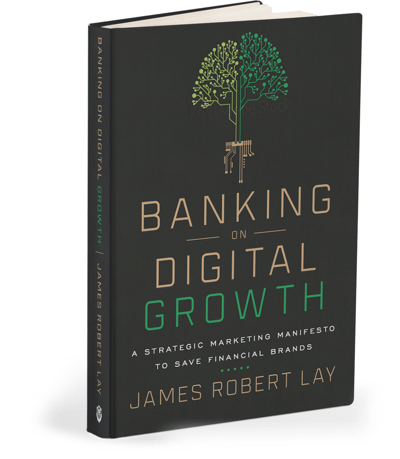“I think where anxiety and hesitation come in with AI is in not knowing what it is or what it could be.” -Evan Ryan
Over the years, Hollywood and dystopian novels have instilled the idea that artificial intelligence (AI) is here to destroy humanity. But in the real world, AI works as a collaborative teammate that paradoxically helps companies act more human.
Evan Ryan, the founder and CEO of Teammate AI and author of the book AI as Your Teammate joined the Banking on Digital Growth Podcast to breakdown what AI can do for financial brands.
The First Step for Financial Brands: Demystifying AI
Ryan has helped hundreds of businesses save millions of hours and dollars with the assistance of AI. These companies are automating repetitive tasks and simplifying what used to be complex, multi-day processes.
Along the way, he’s helping demystify AI and remove the fear that often accompanies digital transformation. Financial brands are seeing the positive impacts of embracing AI and incorporating it into their digital strategies.
Evan says AI is a way to cut through the chaos of the digital world. “I think as it pertains to AI, the most difficult part is defining it and understanding what it is and what it is not.”
AI is a teammate. It’s not here to take your job. This sounds so simple, but it’s difficult to build trust and help people make this mental transition.
Related Content: Banking AI: Humanizing the Exceptional
A good strategy is to encourage employees to think of AI as something that helps them do their jobs more easily and effectively. Evan sits next to people working at their computers and asks them about automating mundane tasks.
“We're saying, ‘Well, why does it have to be done by you? Why can't it just be done by the computer?’” Evan says. He encourages them to view the AI as a friendly teammate who frees up their time and allows them to enjoy the more rewarding parts of their jobs.
This harkens back to Evan’s early days in the tech industry. He attended conferences and saw AI experts talking about what would be possible in 30 to 50 years. He thought, “Could you use AI to just get rid of all the boring stuff in your life?”
Related Content: Delivering a More Human Experience Through Automation
That’s why the subtitle of his book, “AI as Your Teammate,” is “Electrify Growth Without Increasing Payroll.” Evan wanted to keep the focus on the simple, everyday business details where AI has the greatest potential to make a difference for his fellow human beings.
“Nobody wants to live a boring life,” Evan says. AI allows people to stop wasting time on the boring stuff and start spending more time on exciting, high-value activities that feel more rewarding and productive.
Common Artificial Intelligence Misconceptions at Banks and Credit Unions
Perhaps the most common misconception Evan hears about AI is that it’s extremely expensive to deploy at the average financial brand. This might be true if you’re doing something highly complex, like adding a fleet of self-driving cars, but AI is usually a fairly inexpensive cost saver.
If you’re just trying to merge Stripe transactions with QuickBooks, it won’t be expensive. If you’re trying to auto-populate documents and make doing your paperwork easier, that’s a very low-cost option. There are now user-friendly AI platforms that cost just $10 to $20 per month.
Another myth is that AI can’t be deployed unless you have a large internal development team. Not true! It doesn’t take a huge team to implement most AI strategies. Evan says it’s not about how many people you have on the job, but about having the right people on the job.
Do you have a small handful of people who are open to AI implementation? Even if they don’t have the right skills yet, would they thrive with more education and training? Could an outside consultant or AI company help you make it happen?
Finally, don’t fall for the misconception that AI is only for programmers and designers. Any department in your organization can use it and benefit from it. Evan has seen effective deployments of AI in marketing, sales, operations, HR, and much more.
How to Find the Formula for AI Success
We've seen just as many companies fail to use AI properly as we've seen succeed. So how do financial brands find success with AI?
Evan says to start with establishing what each person in the company does in a day, week, or month. Create a list of these tasks and score them from 1 to 5, where 1 is boring work that could be easily automated and 5 is exciting and fulfilling work humans should be handling.
Now notice how much busy work could be automated. Focus on automating tasks that are both time-consuming and boring. Uninspiring, time-consuming work is draining for human beings and should be turned over to AI processes whenever possible.
From there, start rethinking how to select additional tools to automate processes. Consider using a tool like Zapier, IFTTT, or Microsoft Power Automate to help streamline the processes you’ve identified as the best candidates for AI.
Consider how this process is impacting your hiring and retention programs.
Can you now hire people with different skills and strengths?
Is your C-suite supportive of AI transformation, or do you need more leadership in this regard?
In banking and finance, Evan still sees fears among C-suite execs that AI will do the wrong things at their companies. When a human does the wrong thing, you can reprimand or fire them. But how do you fire an AI?
Plus, finance execs tend to think big. They’re worried about what happens if AI causes problems at a greater scale. If something just goes wrong once, it’s a small problem. When something goes wrong 10,000 times, it’s a huge problem.
This is why it’s important to keep in mind that there’s no need to go into AI like a firestorm. Focus on small victories and incremental steps, becoming more comfortable with the AI as it shows success.
Put someone in charge of AI implementation and don’t pressure them to make a big impact too quickly. Treat them almost as a mini-internal consultant and allow them the time and resources to take baby steps with AI transformation. Any small wins are a big deal.
“Progress is greater than perfection,” Evan says. “All creation begins in the mind. That's the whole thought exercise here. I know we're getting super philosophical, but I like going into this space. Who does not have to be a person anymore. Who can be a platform. And that is a big transformation of thinking, I believe, for a lot of leaders in the financial services space.”
This article was originally published on October 6, 2022. All content © 2024 by Digital Growth Institute and may not be reproduced by any means without permission.


